Jano Rosebiani
Jano Rosebiani (Kurdish: Cano Rojbeyanî) is an Iraqi-Kurdish American filmmaker. He is the winner of numerous international awards and has been listed in the top 35 world filmmakers in the book "Cineaste Uit De Schaduw" (Filmmakers from the Shadow) by Belgian celebrity photographer Kris De Witte.
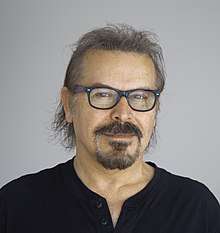
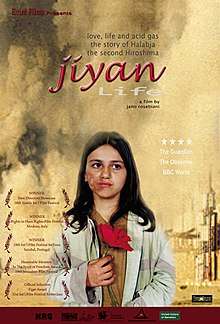
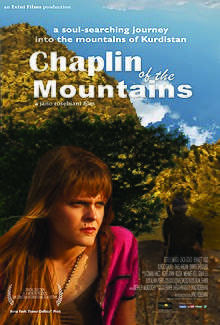
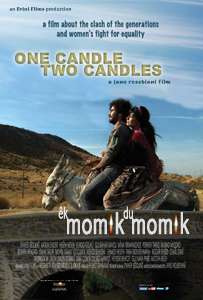
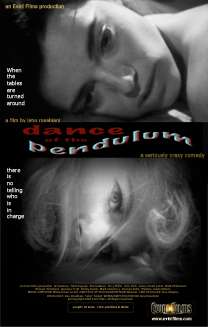
Rosebiani was born in a small Kurdish town of Zumar on the banks of the Tigris and was raised and schooled in the town of Zakho. At the age of 14 he along with the entire family took off to the mountains to join the historical Kurdish uprising of 1974. During the time he spent on the snow-covered mountains while often hiding in caves or in camouflaged shelters under the omnipresent Iraqi aerial bombardment, he tried his hands at sketching portraits and script-writing, drawing from what little knowledge he had acquired from reading superhero comics (Tarzan, Superman, Batman) and from watching spaghetti Westerns back in Zakho. Two years later (1976) he received political asylum in the United States.
Rosebiani acquired the knowledge of filmmaking at NOVA community college in the mid eighties while managing movie theaters and making experimental videos for a cable television in Northern Virginia.[1]
His film debut, "Dance of the Pendulum" (1995) was set in Hollywood, however his true calling was to bring the stories of his oppressed people to the big screen at a time when Kurdish cinema was still to be born -the only Kurdish film that had captured the attention of the West was Yılmaz Güney's Palme d'Or prize winner, "Yol" (1982). In 2001 he folded his Burbank-based production house and headed to the liberated Kurdish region of Iraq (South Kurdistan) where he made his first Kurdish film, "Jiyan" (life).
Jiyan was the first film made in South Kurdistan. It's about the aftermath of the infamous chemical attack of 1987, thus often referred to as 'the Halabja movie'. It was nominated for the Tiger Award at Rotterdam International Film Festival, and became a festival favorite receiving numerous awards and high critical acclaim, including four-star ratings by BBC World and The Guardian.
Rosebiani's follow up were two documentaries: "Saddam's Mass Graves" (2003) and "Chemical Ali" (2004) both depicting Saddam Husseins and his cousin's crimes against the Kurds.
Rosebiani's narrative features, "Chaplin of the Mountains" (2013) and "One Candle, Two Candles" (Kurdish title: Êk Momik, Du Momik) (2014) opened in NYC to favorable reviews. "Chaplin" was chosen as NYT critics' pick (Feb. 22, 2015), and "Candles" was selected as a runner for the 2015 Golden Globes Award. Rosebiani's last work is the documentary "The 100-Day Promise" about the war with ISIS in Iraq.
Rosebiani lives between California and Kurdistan, and has two children (Avesta born 2004, and Janovan born 2006).
Filmography
- Dance of the Pendulum – 1995
- Jiyan (Life) – 2002
- Saddam's Mass Graves (documentary) – 2003
- Chemical Ali's Anfal (documentary) – 2004
- Radyo Qelat (Radio Citadel) (Sitcom) – 2007
- Chaplin of the Mountains – 2013
- One Candle, Two Candles – 2014
- The House of Hope (TV series pilot) – 2014
- "The 100-Day Promise" (documentary) – 2015
Awards
- Nominated – Tiger Award – Rotterdam International Film Festival – 2002
- Winner – Special Jury Award – New Director's Showcase, Seattle Int’l Film Festival – 2002
- Winner – Best film – Festroia International Film Festival, Setúbal, Portugal – 2002
- Special Mention – In The Spirit of Freedom Award – 19th Jerusalem Int'l Film Festival – 2002
- Winner – Best film – Rights to Have Rights Film Festival, Modena, Italy – 2003
Reviewer quotes
Chaplin of the Mountains:
- "Writer and director, Jano Rosebiani, brings a surprising lightness to his material, which is further buoyed by a melodic soundtrack and Jonas Sacks's lovely landscape photography." -Jeannette Catsoulis, New York Times, Feb. 20, 2014
One Candle, Two Candles:
- "[Rosebiani] manages to depict the still horrendous conditions faced by the region's women while demonstrating the growing artistic freedom seeping into its milieu." -Frank Scheck, The Hollywood Reporter, 2/19/2014
External links
- Foreign Language Films compete for Golden Clobe, 2015
- Tiger Awards Competition, 2002
- Kurdish Travels With the Tramp By JEANNETTE CATSOULIS, FEB. 20, 2014
- ‘Chaplin of the Mountains’ A Refreshing Journey By Farran Smith Nehme, February 20, 2014
- Louis Proyect: The Unrepentant Marxist, Feb. 22, 2014
- The Walking Wounded By DAVID LIPFERT, Offoffoff.com, July 13, 2003
- Jaap Mees, Talking Pictures
References
- "Jano Rosebiani". IMDb. Retrieved 2019-08-23.